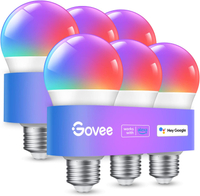3 ways I'm using smart bulbs to make my life a bit easier
Don’t underestimate the value of a simple smart bulb
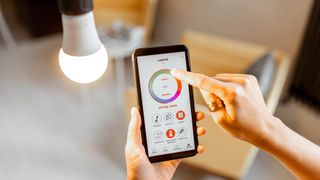
If you’re just getting started with the best smart lights, it’s easy to be overwhelmed by all of the different options out there let alone the brands.
From smart light strips you can mount behind your TV or monitor to smart outdoor string lights that can transform your backyard, you have plenty of choices to make when it comes to building out one of the most essential parts of your smart home.
You also want to keep in mind that like the perfect desk setup, the best smart homes are constantly evolving as you discover new products you want to try or come up with clever new ways to use your existing smart devices.
I’ve personally been building out my own smart home since 2018, and I’ve learned quite a lot over the past six years. While I was limited to what I could do when living in an apartment, moving into a house gave me even more opportunities to experiment with different lights and brands.
Govee Smart Light Bulbs (6-pack): <a href="https://target.georiot.com/Proxy.ashx?tsid=45724&GR_URL=https%3A%2F%2Famazon.com%2Fgp%2Fproduct%2FB0BK82XJWB%3Ftag%3Dhawk-future-20%26ascsubtag%3Dhawk-custom-tracking-20" data-link-merchant="Amazon US"" target="_blank" rel="nofollow">was $60 now $45 @ Amazon
Govee's smart light bulbs are one of the most affordable ways to add smart lighting to your existing light fixtures and lamps. You can control them with the Govee app or with Alexa or Google Home devices. They also come with 54 preset scene modes to set the mood for any occasion.
I started out with Philips Hue lights but after trying a few smart lights from Govee, I’m in the process of moving over my existing smart lights to this more affordable brand. As such, I recently picked up a six pack of Govee Smart Light Bulbs ($60, Amazon).
While I was swapping out some of my existing Philips Hue lights and finally getting rid of the last few normal bulbs left in my house, I came up with some clever new ways to use smart bulbs to make my life a bit easier. Here are the top three ways I’m using smart bulbs to make things easier for myself and my family.
Color-coded laundry reminders
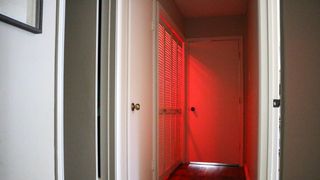
There’s nothing worse than going to start a new load of laundry and realizing that you or someone else forgot to flip a load the last time around. Not only does this set back your plans of getting all of the laundry done in a timely manner but it can also lead to bacteria and mold growing on your clothes.
As part of my recent smart light upgrades, I wanted to swap out the normal bulbs in my hallway with smart ones. However, the glass globes that go over my hallway lights were painted white and the light just didn’t shine through well enough from my new smart bulbs, even with two in each fixture.
Since I had quite a few smart bulbs to work with, I decided to add one to the light fixture in my laundry room. Not only can I turn it off with my phone or voice if I forget to but I can also put its 16 million DIY colors to good use.
I’ve now been switching this smart bulb to red when there’s a load in the washer and changing it to green when the last remaining load is in the dryer. This way, when I walk by my laundry room, I know exactly which stage my clothes are at. I’ll see if I keep up with this over time but I’ve done the laundry for my whole family twice now and I haven’t left a load of wet clothes in the washer yet.
Playtime countdown
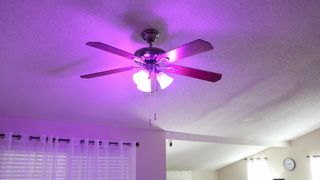
Convincing your kids to wrap up playtime and start getting ready for bed is hard enough as it is, but it’s even harder when you have a toddler who’s just learning to communicate. I figured this upgrade cycle could give me a chance to change that.
Above my son’s playroom, there’s a fan with three fixtures for normal-sized bulbs. Up until now, I had standard white Philips Hue bulbs installed there because at around $50 a pop, it was hard to justify adding colored Hue smart bulbs to this light. With my new smart bulbs in hand, I decided now was the perfect time to upgrade this light, especially since Govee’s budget-colored smart bulbs tend to work best when they are out in the open and aren’t obscured by tinted glass.
In the picture above, the lights are set to purple as they give off a nice glow but during playtime, I have them set to bright white so my son can see his toys. However, when it’s getting close to bath time, I ask Alexa to turn them red in 10 or 5 minutes.
While we’re still working on our colors and what they mean, once my son learns about traffic lights and red light, green light, I’m sure he’ll understand the idea. Until then though, exposed, colored smart bulbs in a big open room like this can be a lot of fun to play around with, especially at parties or during holidays.
Bye bye pull chain
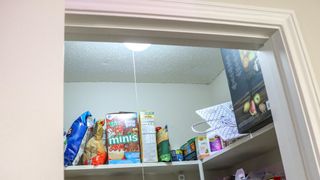
When I first moved into my house, I was met with problem after problem as you might expect with an older home. One of the first things that threw me off was that several of the closet lights had pull chains that were either too short or felt like they could give way with too hard of a tug. Naturally, I swapped out these normal bulbs with smart bulbs and that was the end of it, at least for me anyway.
One of the hardest things about having a smart home with smart lights is that visitors don’t know this unless you tell them. Walking everyone who comes to your house through how to use your smart lights with either Alexa or Google Assistant gets old pretty fast.
For this reason, when swapping out the old white smart bulb in my pantry with a new colored one, I also decided to add a motion sensor. My reasoning being that if the light suddenly turns on, visitors will be less inclined to try tugging at the fragile pull chain in my pantry.
I used the GoveeLife Motion Sensor ($13, Amazon) for this project but Philips Hue also sells a motion sensor for its smart lights but it costs three times as much. Getting the sensor set up and installed was pretty easy and it reminded me of when I added Govee’s Wireless Mini Smart 6 Button Sensor to my smart home to control my outdoor smart lights last summer.
I did have to create a routine for the motion sensor to automatically turn on my pantry light but it only took a few minutes to get this set up in the Govee app. To save energy, I also configured the routine to turn off the pantry light after five minutes.
Endless possibilities
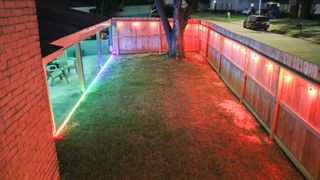
So there you have it, these are three ways I’m using ordinary smart light bulbs to make my life a little easier. One of my favorite things about smart lights and the best smart home devices in general is that you can always come up with a new use case for them, even if you’ve had them for years.
For instance, last summer, I used an Echo Dot to cool down my garage by having it turn on a few fans once the temperature inside the garage exceeded a certain limit. Getting a new device to play around with is always fun but figuring out a new way to use the smart gadgets you already have feels even better.
If you’ve been on the fence about adding smart lights to your home, there’s never been a better time to do so. In the past few years, the price of smart bulbs, smart lightstrips and other smart lights have really come down as newer companies like Govee have entered the market.
One word of advice though, before you start building out your DIY smart home, you want to plan accordingly as things can quickly get out of hand both logistically and financially. However, if you know how you want to smarten up your house beforehand, the whole process can go a lot smoother.
More from Tom's Guide
Sign up to get the BEST of Tom’s Guide direct to your inbox.
Upgrade your life with a daily dose of the biggest tech news, lifestyle hacks and our curated analysis. Be the first to know about cutting-edge gadgets and the hottest deals.

Anthony Spadafora is the security and networking editor at Tom’s Guide where he covers everything from data breaches and ransomware gangs to password managers and the best way to cover your whole home or business with Wi-Fi. Before joining the team, he wrote for ITProPortal while living in Korea and later for TechRadar Pro after moving back to the US. Based in Houston, Texas, when he’s not writing Anthony can be found tinkering with PCs and game consoles, managing cables and upgrading his smart home.
